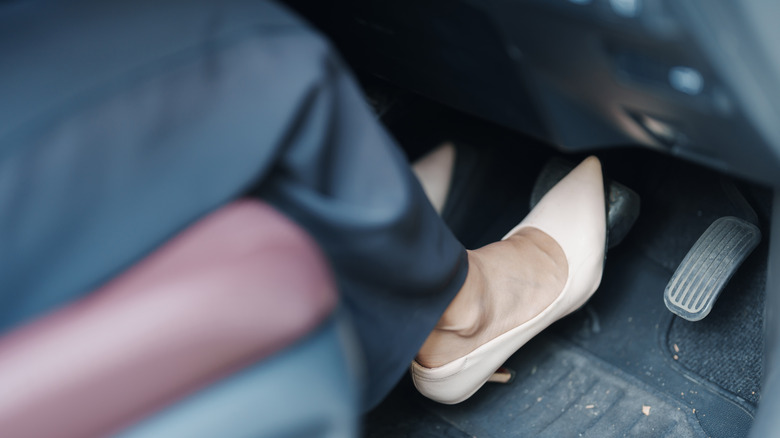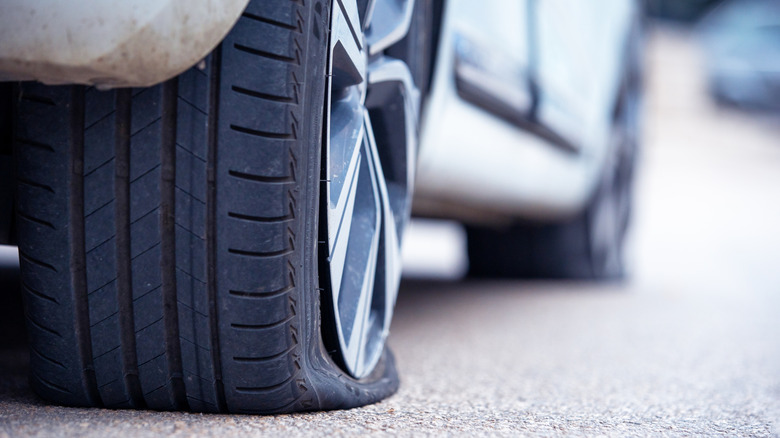Can Slamming Your Brakes Damage Your Car?
There's an argument to be made for brakes being one of if not the most essential component of your car. Without them, you wouldn't be able to control your car's speed or stop it entirely, at times being the literal difference between life and death, whether pulling out your neighborhood driveway or racing down one of the most dangerous highways in America. This is especially true in the instances where you have to slam on the brakes.
Putting an immense amount of force on your brakes is a necessity from time to time. Sudden road hazards such as potholes, crossing animals, fallen branches, and broken down vehicles can give you a fright and trigger you to make a sudden stop. Coming to a complete stop in such situations can be imperative to allow time for you to best judge how to move around the obstruction while keeping other potentially unaware drivers alert to the hazards.
However, slamming on the brakes should not be the default by any means. Placing such extreme pressure on your brakes regularly can lead to a host of problems down the line, ironically placing you and your car in more danger. Thankfully, avoiding these issues is easy so long as you practice healthy driving habits and maintenance. Keep reading to learn more about the issues that can come about from slamming your brakes and how to avoid such habits if you find yourself engaging in them often.
Slamming the brakes can be hazardous for your car
Your brakes, like every part of your car, will experience wear and tear overtime. This is inevitable as your brakes endure frequent use, but the speed in which they lose momentum will depend on how far you push them regularly. Constantly riding on the brakes is a surefire way to shorten their lifespan while doing additional damage to other components of your vehicle.
The friction that comes about from your brakes being pushed will produce a generous amount of heat, which is amplified the harder you strain the system. This can bring about a great deal of damage to the pads, rotors, and other components with surprising speed. Additionally, the heat and pressure can cause the hoses holding in your brake fluid to wear out quicker, resulting in leaks and an overall weakened performance.
Other components of your car are at risk as well. The smell of burnt rubber that typically follows hard braking is the result of your wheels locking up and a section of your tires rubbing against the pavement. This can result in unevenness and increase the chances of getting a flat tire. It can also harm your vehicle's steering and suspension that are equally crucial for control and efficiency.
You put yourself at greater risk of harm
The results of an improperly functioning car brake system can be catastrophic. On top of the costly repairs and potential fines you risk, you also put your life on the line — as well as the lives of others in the vehicle and on the road — by abusing your brakes. As we've already stated, overworked brakes can create number of problems with the functional components of your car, but they can also harm features needed for safety.
In some instances, a car's Anti-lock Brake System will activate when the brakes are slammed. Your ABS is an essential safety element, maintaining steady control of your wheels in the case of an accident or poor road condition. Continuously hitting your brakes with intense pressure and triggering the ABS again and again will have it wear out and fail more rapidly. Keep an eye out for an especially long-lasting ABS sign on your dashboard. This, especially if paired with a brake warning, are key signs that your brakes are being pushed past their limits and should be looked at by a professional mechanic immediately.
When driving, stay vigilant on the road for hazards and maintain a steady speed so that if danger does pop up, you can take more time to slow down. Driving too closely to other cars, along with causing you to fail a driver's test, also increases your chances of hitting the brakes hard, so be sure you're maintaining a comfortable distance. Additionally, staying on top of regular brake maintenance such as changing brake fluid and replacing old pads will go a long way into keeping them healthy.


